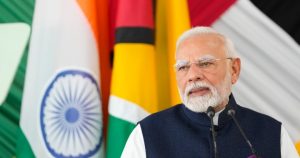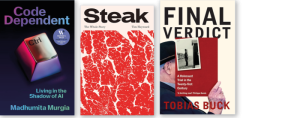How contested votes and foreign influence are rocking EU accession
This article is an on-site version of our Europe Express newsletter. Premium subscribers can sign up here to get the newsletter delivered every weekday and Saturday morning. Standard subscribers can upgrade to Premium here, or explore all FT newsletters
Good morning.
Today, my colleagues preview an assessment of aspiring EU members’ progress towards integration. And our Berlin bureau chief explains why disparate initiatives to salvage German businesses may be a symptom of the coalition government in Berlin unravelling.
Obstacle race
The European Commission will tomorrow assess aspiring EU countries’ progress towards joining the bloc. Spoiler: don’t expect a lot, write Paola Tamma and Alice Hancock.
Context: The EU executive gives regular updates about the state of negotiations with aspiring members including Ukraine, Moldova, Georgia, Turkey and countries in the Western Balkans.
The process comes hot on the heels of a referendum in Moldova marked by Russian interference, and contested election results in Georgia with reports of intimidation at the ballot box.
In its recommendations, the EU walks a tricky line between encouraging countries to join, and keeping strict standards of rule of law and governance.
The commission’s report will note progress in a few cases including Ukraine and Moldova, without formally recommending that they advance in the EU accession process, according to people familiar with the contents.
Countries making the strongest strides towards EU membership were ironically those most exposed to conflict — Moldova and Ukraine, one person with knowledge of the report said.
The commission will not recommend specific actions to take regarding the state of play in Georgia — yet. A spokesperson yesterday called on authorities in Tbilisi to “swiftly, transparently and independently investigate” electoral irregularities, but added that it was for EU member states to decide “a way forward to address this situation”.
Ministers from 13 member states, including France, Germany and the Netherlands, signed a statement yesterday saying that the electoral “violations” were “incompatible with the standards expected from a candidate” to the EU, and condemning Hungarian premier Viktor Orbán’s visit to the country.
In July, the EU had already frozen Georgia’s accession process and redirected around €30mn in aid from the government to civil society. EU leaders are set to discuss the next steps at an informal meeting in Budapest next week.
In June, the commission had proposed options including sanctioning entities or individuals — though this would probably encounter opposition from Hungary — and restricting visa-free travel, according to a document seen by the FT.
As for Western Balkans, commission president Ursula von der Leyen was on a tour of the region last week to keep applicants’ spirits high. But bar Albania, which received thumbs up to start negotiations earlier this month, and Montenegro, by far the most advanced EU bid, there’s not a lot of progress to note.
Chart du jour: Carmageddon
Europe’s automotive industry faces a perfect storm of slowing demand, ferocious Chinese competition and the transition to electric cars. Read our deep dive into the car industry’s woes here.
Double booked
German business leaders wanting to discuss their plight with the government are getting two meetings for the price of one today. But while they may rejoice at the attention, the separate events herald bad news for the coalition government’s unity, writes Guy Chazan.
Chancellor Olaf Scholz will host an “industry summit” in the chancellery this afternoon, just after a similar event by finance minister Christian Lindner in parliament.
Context: The duelling summits symbolise the increasingly muddled nature of Germany’s economic policy, as evidence grows that Scholz’s fragile coalition of Social Democrats, Greens and Liberals could be edging towards collapse.
“To be honest, we’re just rolling our eyes at this point,” said one business lobbyist.
The summits were scheduled in response to Germany’s increasingly bleak economic situation, with the country facing its first two-year recession since the early 2000s.
Carmaker Volkswagen plans to close at least three German plants and axe tens of thousands of jobs. The mood in business has rarely been so downbeat.
Scholz’s summit with businesses and unions is supposed to hammer out a plan for getting Germany out of its current mess. But the Social Democrat chancellor pointedly failed to invite his own economy and finance ministers — Robert Habeck of the Greens, and Lindner of the pro-business FDP.
Habeck responded with his own proposals for boosting investment, without previously agreeing them with cabinet colleagues, while Lindner announced he would host a separate get-together on the same day as Scholz’s shindig.
He invited the heads of leading trade bodies who had been snubbed by Scholz, such as the employers’ federation BDA, the chambers of commerce and the family business association.
The rival initiatives have only enhanced the aura of chaos surrounding Scholz’s government, and stoked speculation that the coalition might fall apart in the coming weeks, triggering snap elections.
“Ministers should be sitting down and hammering out a joint programme of structural reforms,” the lobbyist said. “Instead it’s just every man for himself.”
What to watch today
-
Finnish President Alexander Stubb meets Chinese President Xi Jinping in Beijing.
-
Ukrainian President Volodymyr Zelenskyy joins Nordic leaders at Nordic Council meeting in Reykjavik.
Now read these
Recommended newsletters for you
Trade Secrets — A must-read on the changing face of international trade and globalisation. Sign up here
Swamp Notes — Expert insight on the intersection of money and power in US politics. Sign up here
Are you enjoying Europe Express? Sign up here to have it delivered straight to your inbox every workday at 7am CET and on Saturdays at noon CET. Do tell us what you think, we love to hear from you: [email protected]. Keep up with the latest European stories @FT Europe
#contested #votes #foreign #influence #rocking #accession






